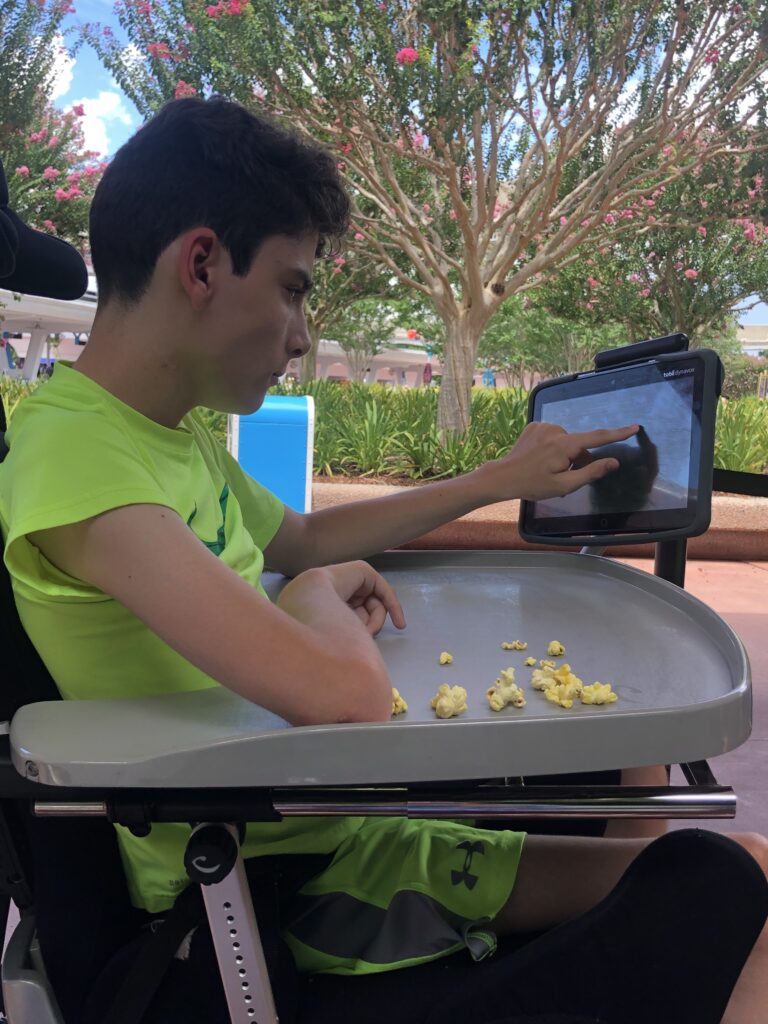
The links between our personalities, our voices, how we communicate, and the technology that helps us to do so are not always obvious—until you meet someone like Jeffrey Flanders.
Jeffrey, 15, is funny, resourceful, and totally rocking the art of self-expression. He is chatty, though primarily nonverbal because of his cerebral palsy. Jeffrey warms up fast when he meets someone new to talk with, using his Tobii Dynavox I-110 assistive communication device with Snap software to help him.
“It opened up such a door,” said his father, Jeff. “He learned it within the first year.”
Just a few years ago, Jeffrey’s parents and younger sister relied almost solely on yes/no questions or his occasional murmur of sounds like “ga” to make any headway in their conversations.
“That was our basis,” his father said, recalling their reservations about other solutions. “We were skeptical as to whether anything would work.”
Conveying his thoughts by pointing to pictures or handing them to others was not quite Jeffrey’s style. He longed for smoother and more detailed interactions. An iPad with older AAC software helped for a while, but there were inconsistencies in the setup, so Jeffrey needed a lot of cueing. Since he got the I-110 with Snap during the 2019-2020 school year, he is enjoying communication on his own terms, which means the world when you’re in high school.
Jeffrey’s speech therapist Jenna Buterbaugh initiated this new solution
“She is phenomenal,” said teacher Darcy Rakar after close collaboration with Buterbaugh and others on Jeffrey’s team to insure him a successful experience with the technology. “She has really embraced it and it helps us.”
Remote learning during the COVID-19 pandemic presented a wonderful opportunity for everyone to work together and for Jeffrey’s parents to watch his success unfold during online speech sessions because the three of them were at home together more often.
Dakar praised Jeffrey’s use of grammatically correct language and his knack for stringing little words and bigger ones to create longer and more meaningful sentences.
Jeffrey is not shy about asking questions whether on the school bus, in the classroom, or on a video call. “Do you have pets?” is one of his favorites and often leads him to mention his dogs Lizzie, Honey, Chewy and Peaches. Sometimes the subject shifts to the next concert he has tickets for. Jeffrey has the names and songs of nearly 100 artists on his I-110, along with vocabulary to elaborate on his experiences as a country music and Kiss fan. “I can’t watch Kiss until my dad says it’s OK,” he’ll tell you.
Buterbaugh applauds his creativity
“He is very curious about situations and people, and he has great problem-solving skills for communicating a message.” When Jeffrey did not see the name Matt in his device content, for instance, he set out to find a workaround for interactions with the man who fixes his wheelchair and decided instead to use an image for a floor mat in the device to address “Matt” from then on. “It’s not just requesting, it’s commenting (and) showing humor,” Buterbaugh said. “It’s nice to see his personality shine.”
There are many things to like about the device, his father says, especially its robust speakers. But the real gem is getting to know his son on a whole new level.
“Our relationship blossomed,” Jeff Flanders said. “I never know what he is going to say. It brings me to tears sometimes.”
Author: Patti Murphy, Communication Specialist, Tobii Dynavox www.tobiidynavox.com

